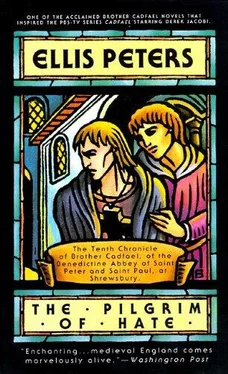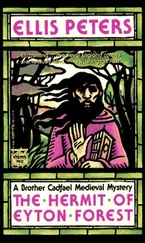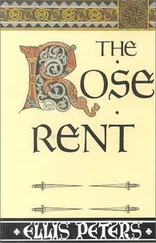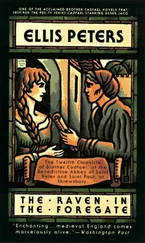While they stood rapt, the sunset light had deepened, blazed and burned silently into glowing ash, and the first feathery shade of twilight, like the passing of a swift’s wings, fled across their faces and melted into sudden pearly, radiant light. Her wide eyes were brimming with tears, almost the match of his. When he stooped to her, there was no way of knowing which of them had begun the kiss.
The little bell for Compline sounded clearly through the gardens on so limpid an evening, and stirred Brother Cadfael out of his half-doze at once. He was accustomed, in this refuge of his maturity as surely as in the warfaring of his youth, to awake fresh and alert, as he fell asleep, making the most of the twin worlds of night and day. He rose and went out into the earliest glowing image of evening, and closed the door after him.
It was but a few moments back to church through the herbarium and the rose garden. He went briskly, happy with the beauty of the evening and the promise for the morrow, and never knew why he should look aside to westward in passing, unless it was that the whole expanse of the sky on that side was delicate, pure and warming, like a girl’s blush. And there they were, two clear shadows clasped together in silhouette against the fire of the west, outlined on the crest above the slope to the invisible brook. Matthew and Melangell, unmistakable, constrained still but in each other’s arms, linked in a kiss that lasted while Brother Cadfael came, passed and slipped away to his different devotions, but with that image printed indelibly on his eyes, even in his prayers.
THE OUTRIDER of the bishop-legate’s envoy-or should he rather be considered the empress’s envoy?-arrived within the town and was directed through to the gatehouse of the castle in mid-evening of that same twenty-first day of June, to be presented to Hugh Beringar just as he was marshalling a half-dozen men to go down to the bridge and take an unpredicted part in the plans of Master Simeon Poer and his associates. Who would almost certainly be armed, being so far from home and in hitherto unexplored territory. Hugh found the visitor an unwelcome hindrance, but was too well aware of the many perils hemming the king’s party on every side to dismiss the herald without ceremony. Whatever this embassage might be, he needed to know it, and make due preparation to deal with it. In the gatehouse guard-room he found himself facing a stolid middle-aged squire, who delivered his errand word perfect.
“My lord sheriff, the Lady of the English and the lord bishop of Winchester entreat you to receive in peace their envoy, who comes to you with offerings of peace and good order in their name, and in their name asks your aid in resolving the griefs of the kingdom. I come before to announce him.”
So the empress had assumed the traditional title of a queen-elect before her coronation! The matter began to look final.
“The lord bishop’s envoy will be welcome,” said Hugh, “and shall be received with all honour here in Shrewsbury. I will lend an attentive ear to whatever he may have to say to me. As at this moment I have an affair in hand which will not wait. How far ahead of your lord do you ride?”
“A matter of two hours, perhaps,” said the squire, considering.
“Good, then I can set forward all necessary preparations for his reception, and still have time to clear up a small thing I have in hand. With how many attendants does he come?”
“Two men-at-arms only, my lord, and myself.”
“Then I will leave you in the hands of my deputy, who will have lodgings made ready for you and your two men here in the castle. As for your lord, he shall come to my own house, and my wife shall make him welcome. Hold me excused if I make small ceremony now, for this business is a twilight matter, and will not wait. Later I will see amends made.”
The messenger was well content to have his horse stabled and tended, and be led away by Alan Herbard to a comfortable lodging where he could shed his boots and leather coat, and be at his ease, and take his time and his pleasure over the meat and wine that was presently set before him. Hugh’s young deputy would play the host very graciously. He was still new in office, and did everything committed to him with a flourish. Hugh left them to it, and took his half-dozen men briskly out through the town.
It was past Compline then, neither light nor dark, but hesitant between. By the time they reached the High Cross and turned down the steep curve of the Wyle they had their twilight eyes. In full darkness their quarry might have a better chance of eluding them, by daylight they would themselves have been too easily observed from afar. If these gamesters were experts they would have a lookout posted to give fair warning.
The Wyle, uncoiling eastward, brought them down to the town wall and the English gate, and there a thin, leggy child, shaggy-haired and bright-eyed, started out of the shadows under the gate to catch at Hugh’s sleeve. Wat’s boy, a sharp urchin of the Foregate, bursting with the importance of his errand and his own wit in managing it, had pinned down his quarry, and waited to inform and advise.
“My lord, they’re met-all the four from the abbey, and a dozen or more from these parts, mostly from the town.” His note of scorn implied that they were sharper in the Foregate. “You’d best leave the horses and go afoot. Riders out at this hour-they’d break and run as soon as you set hooves on the bridge. The sound carries.”
Good sense, that, if the meeting-place was close by. “Where are they, then?” asked Hugh, dismounting.
“Under the far arch of the bridge, my lord-dry as a bone it is, and snug.” So it would be, with this low summer water. Only in full spate did the river prevent passage beneath that arch. In this fine season it would be a nest of dried-out grasses.
“They have a light, then?”
“A dark lantern. There’s not a glimmer you’ll see from either side unless you go down to the water, it sheds light only on the flat stone where they’re throwing.”
Easily quenched, then, at the first alarm, and they would scatter like startled birds, every way. The fleecers would be the first and fleetest. The fleeced might well be netted in some numbers, but their offence was no more than being foolish at their own expense, not theft nor malpractice on any other.
“We leave the horses here,” said Hugh, making up his mind. “You heard the boy. They’re under the bridge, they’ll have used the path that goes down to the Gaye, along the riverside. The other side of the arch is thick bushes, but that’s the way they’ll break. Three men to either slope, and I’ll bear with the western three. And let our own young fools by, if you can pick them out, but hold fast the strangers.”
In this fashion they went to their raiding. They crossed the bridge by ones and twos, above the Severn water green with weedy shallows and shimmering with reflected light, and took their places on either side, spaced among the fringing bushes of the bank. By the time they were in place the afterglow had dissolved and faded into the western horizon, and the night came down like a velvet hand. Hugh drew off to westward along the by-road until at length he caught the faint glimmer of light beneath the stone arch. They were there. If in such numbers, perhaps he should have held them in better respect and brought more men. But he did not want the townsmen. By all means let them sneak away to their beds and think better of their dreams of milking cows likely to prove drier than sand. It was the cheats he wanted. Let the provost of the town deal with his civic idiots.
He let the sky darken somewhat before he took them in. The summer night settled, soft wings folding, and no moon. Then, at his whistle, they moved down from either flank.
Читать дальше












